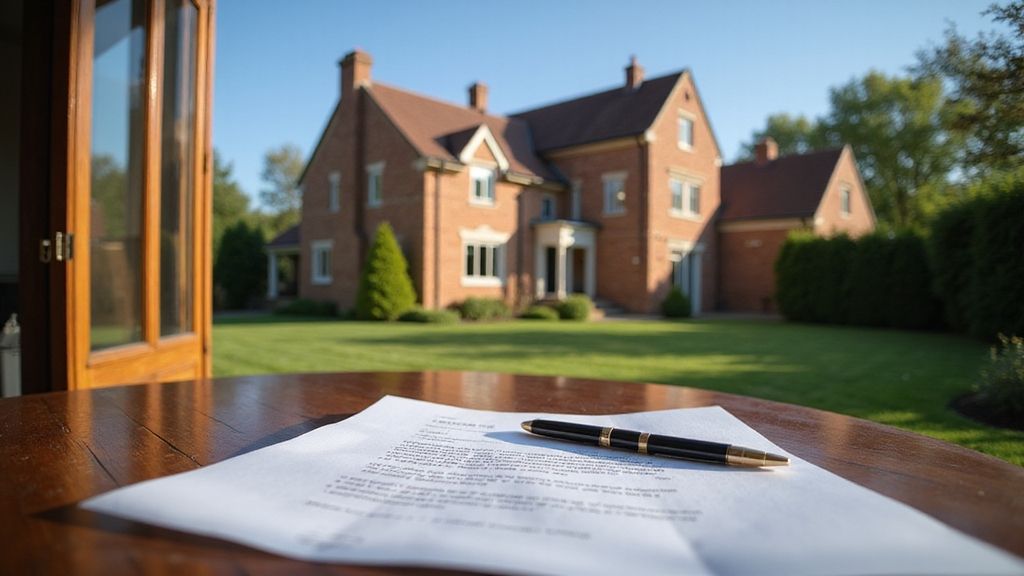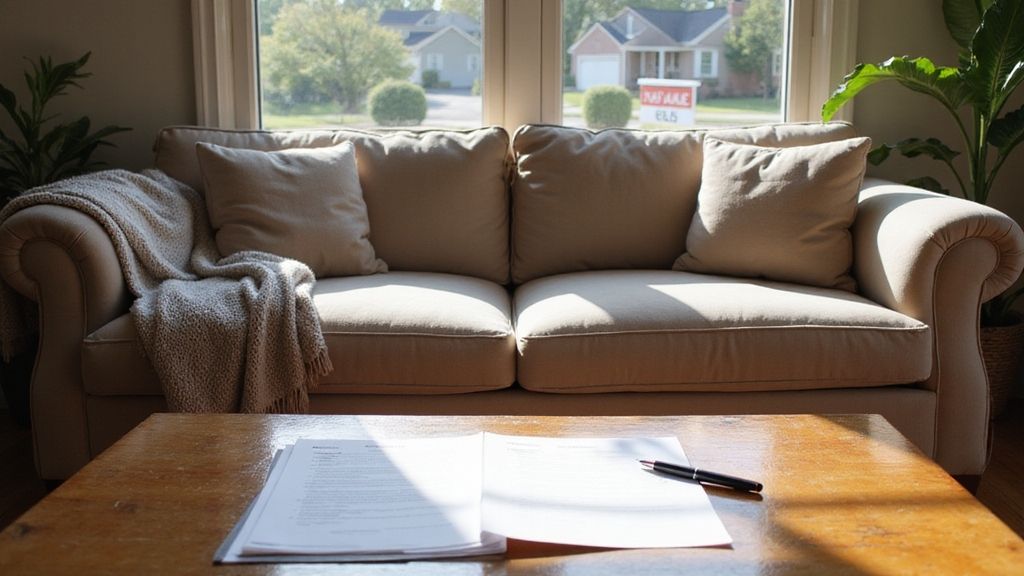How to Sell a House That Has Flooded?

Selling a flood-damaged house creates stress and uncertainty for homeowners facing this challenge. Water damage leaves lasting effects on the property’s structure and value. You need to address buyer concerns, manage repair costs, and navigate complex legal requirements before listing your property.
Your worries about finding qualified buyers might keep you up at night. We understand the fear of financial loss and the pressure to disclose flood history. If potential buyers discover undisclosed flood damage, you could face legal consequences.
The best way to sell a flooded house is through transparent disclosure, proper documentation, competitive pricing, and professional assistance from real estate experts. This guide will walk you through proven strategies to sell your flood-damaged property while maximizing its market value.
Key Takeaways
- Document all flood damage thoroughly with photos, videos, and repair records to demonstrate transparency and build trust with potential buyers.
- Be upfront about flood history during disclosure, as it’s legally required and helps avoid future liability issues.
- Price the property 20-30% below market value to attract investors and renovation specialists interested in flood-damaged homes.
- Complete all necessary repairs and obtain professional inspections to show buyers the property is safe and structurally sound.
- Work with real estate professionals experienced in selling flood-damaged properties to navigate complex negotiations and disclosures effectively.
What Are the First Steps After Flooding?
Floods require quick action to protect your home and belongings from severe damage. You should document all damage with photos before calling your insurance company. It is essential to start a claim right away for proper coverage.
You must remove standing water with pumps or wet vacuums immediately. All wet items like furniture and carpets need quick removal from your house. If you run fans and dehumidifiers, the drying process will speed up significantly. So, this step helps prevent dangerous mold from growing in your home.
We recommend thorough cleaning of every surface that touched floodwater with disinfectants. Professional restoration experts should check your home’s structure and electrical systems. They will create a detailed plan to fix the damage properly. If you keep good records, future home buyers will feel confident about the repairs.
How to Assess Flood Damage?
A flood damage assessment helps identify property losses and supports insurance claims after water damage. You should take photos and videos to document all visible damage immediately. Water lines on walls and damaged items need clear documentation for claims. If structural damage appears serious, you must contact professionals right away.
This assessment should cover several key areas:
- You must check the foundation for cracks and shifting
- We recommend inspecting walls and floors for warping
- Your electrical systems need professional evaluation
- The plumbing requires thorough testing
- HVAC units should undergo safety checks
- Mold inspection is essential in wet areas
- Windows and doors need alignment verification
- Your insulation might require replacement if wet
A certified home inspector can provide detailed evaluation reports. When selecting an inspector, you should choose someone with flood damage expertise. These reports will help with insurance claims processing. If you notice any dangerous conditions, professional help becomes necessary immediately.
Should you contact insurance right away?
You should call your insurance company right after making sure you are safe. Take photos and videos to document all damage before cleanup starts. This evidence will help support your insurance claim.
Your standard home insurance may not include protection against floods. If you want flood coverage, you need a separate flood insurance policy. So, check your policy details to know what your insurance covers.
You must contact the National Flood Insurance Program or private insurer quickly. This is important because insurance companies have strict deadlines for claims. When you speak with insurance representatives, write down their names and conversation details.
If major repairs are needed, wait for an insurance adjuster to check the damage first. While waiting, you can take steps to prevent more damage to your property. Since time matters, keep all receipts and records of your communications with the insurance company.
How do you document the damage properly?
Proper damage documentation requires three main steps: photos, inventory lists, and receipt collection. You should start by taking clear photos of all damaged areas in your property.
We recommend capturing close-up shots of water damage marks on walls and floors. You must record detailed video footage while explaining the visible damage out loud.
A detailed inventory helps track every item that suffered damage in your property. If you create a spreadsheet, you can list each item with its purchase date and value. This information will support your insurance claims later.
When you keep all repair and replacement receipts, the claim process becomes easier. You can store digital copies of these documents in cloud storage for safety. If your insurance company needs proof, you will have quick access to everything.
While documenting damages seems time-consuming, it protects your interests during claims. Hence, you must be thorough with each step of the process. So if problems arise later, you will have solid evidence to support your case.
Is It Safe to Stay in the House?
Staying in a flooded house is unsafe unless emergency officials give clearance. You must prioritize your safety over documenting property damage.
While assessing your home’s condition, these factors need careful evaluation: Electrical systems can pose deadly risks when exposed to floodwater. Your house may contain contaminated water with harmful chemicals and sewage. The foundation and walls could weaken due to water damage.
If you notice strange smells or unusual sounds, you should leave right away. This situation requires immediate attention from professional building inspectors.
You must prepare an evacuation plan before disaster strikes. We recommend staying in touch with local authorities for safety updates. The officials will inform you when it’s safe to return home.
If water damage affects your property, structural problems might develop over time. So, you should monitor your house regularly for any signs of deterioration.
The safety assessment would determine if repairs are necessary. Your insurance company will need detailed documentation of all flood-related damage.
Should You Repair or Sell As-Is?
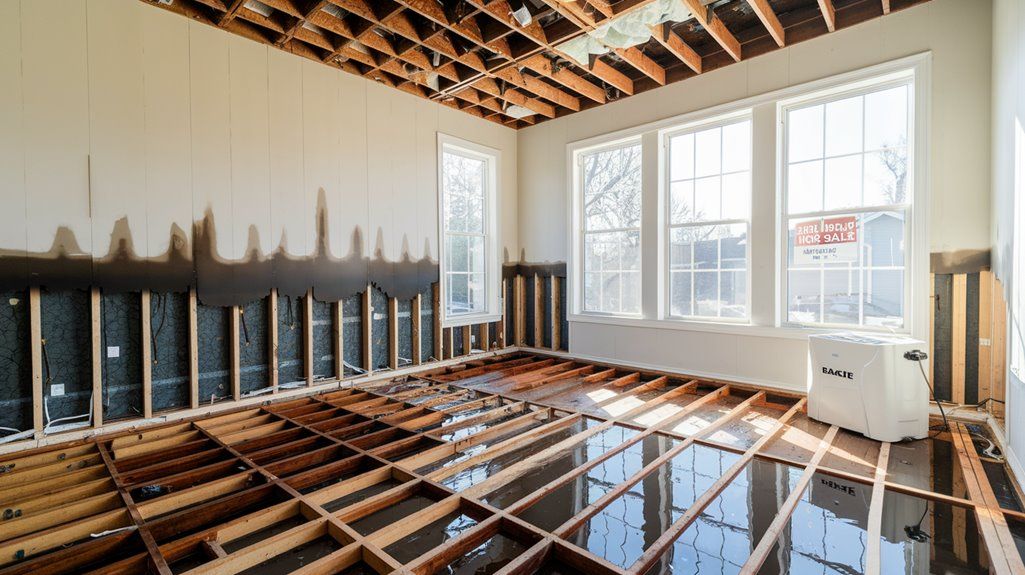
Repairing or selling a flood-damaged property as-is represents a major decision for homeowners. You must evaluate both paths carefully to make the best financial choice. This decision will affect your immediate costs and long-term returns. We understand that repairs can boost your property’s market value significantly. You will attract more traditional buyers with a fully restored home.
If you choose to repair, expect to handle multiple restoration projects. The costs for complete renovation can range between $10,000 and $100,000. You will need to address mold issues, replace damaged drywall, and restore flooring. This process might also require extensive structural repairs in severe cases.
When you sell as-is, investors become your primary target market. This option eliminates repair expenses but results in a lower selling price. So buyers with renovation experience and ready cash will show more interest. If your finances are tight, selling as-is could be your smartest move.
You should consider local market trends before making your final choice. We recommend evaluating your current financial status carefully. This assessment will help determine your best path forward.
Can You Sell a House with Flood Damage?
You can sell a house with flood damage, but you must manage your expectations. A flood-damaged property often sells for less than its original market value.
We recommend considering these key factors before listing your property: Insurance costs play a vital role in the sale of flood-damaged homes. You should gather all documentation about current flood insurance rates for your area. This information will help potential buyers make informed decisions.
If you have made repairs, you must keep detailed records of all restoration work. Your state may require you to disclose previous flood damage to potential buyers.
Real estate investors could be your ideal target market for flood-damaged properties. They often buy homes in as-is condition without requiring extensive repairs first.
When pricing your property, you must account for needed repairs and future risks. You will attract more buyers if your asking price reflects the home’s current condition.
If you maintain transparency about the damage, you can find suitable buyers. While some buyers avoid flood-damaged homes, others see them as investment opportunities.
You should work with real estate agents who have experience selling damaged properties. These professionals understand how to market such homes effectively.
How to Sell a Flood Damaged House?
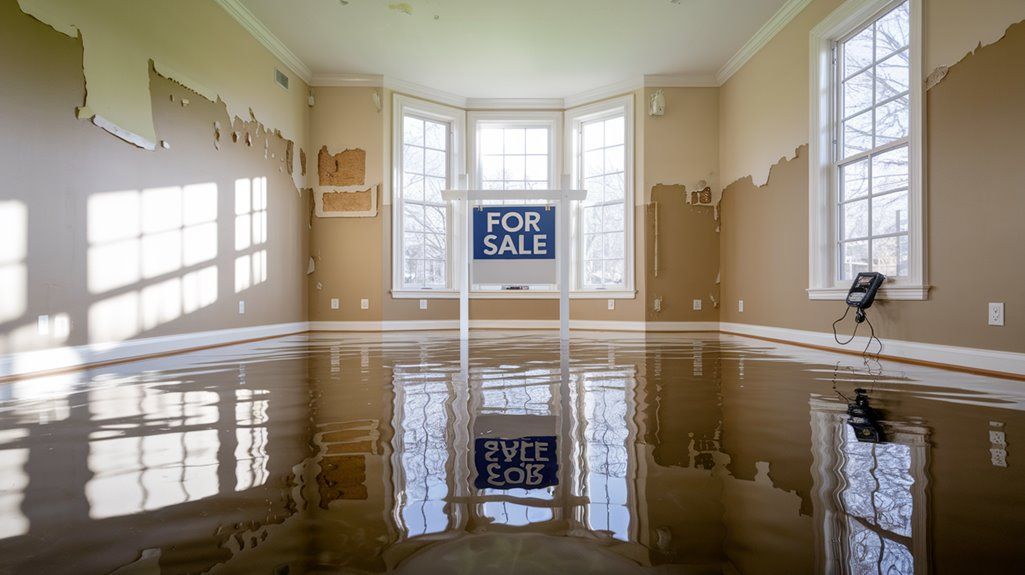
When selling a flood-damaged house, you’ll need to follow critical steps to protect your interests and maximize your property’s value. Your first priorities should be ensuring the property is safe to enter, thoroughly documenting all damage with photos and videos, and immediately contacting your insurance company to file a claim.
You’ll then want to prevent additional damage through proper mitigation techniques and obtain a comprehensive professional inspection to assess the full extent of the flooding’s impact.
Ensure Safety First
Safety First When Selling a Flood-Damaged House You must prioritize safety before starting any flood-damaged house sale process. Since flood damage creates many hazards, contact emergency services right away. You should stay away until officials declare the property safe to enter. This situation requires proper protective equipment like waterproof boots and gloves.
Essential Safety Steps:
- We recommend turning off all utilities to prevent accidents
- You must take photos and videos of damage from safe spots
- Professional testers should check for contamination and structural problems
If you notice any hazardous materials, call specialists immediately for proper handling. While preparing for sale, keep monitoring the property for new safety issues. This water damage often leads to mold growth and weakened structures.
When professionals complete their assessment, you can start planning repairs. Since flood waters contain harmful bacteria, proper cleaning is essential. These safety measures will protect everyone involved in the sale process.
Document the Damage
You must document flood damage accurately for insurance claims and future property transactions. This step begins after confirming the safety of your property.
You should take clear photos of all damaged areas in your home. Walls, floors, and ceilings need proper visual documentation for assessment purposes. Water lines and mold spots require special focus during photography.
If you record videos, these will provide additional proof of structural problems. We recommend creating a detailed report with the flood date and water levels. So, you must save every receipt from repairs and professional cleaning services.
Your insurance company will need proper records of all damage-related expenses. When you contact adjusters, keep notes of claim numbers and their inspection reports. This information will help contractors give accurate repair estimates.
If you plan to sell your property, these records will support your pricing decisions. The detailed documentation will also help buyers understand the property’s history.
Contact Your Insurance Company
You must contact your insurance company as soon as you notice flood damage. If floods damage your home, you should call your insurance provider immediately.
When you talk to your insurance agent, prepare these items:
- Photos and videos that show all water damage clearly
- A full list of damaged items in your home
- All receipts for emergency fixes or temporary housing
You need to write down every conversation with your insurance company. So ask for written proof after you submit your claim. If your adjuster hasn’t checked the damage yet, avoid making big repairs. Yet, you should take basic steps to stop more damage from happening.
While waiting for the adjuster, you can remove standing water from your home. This step will prevent mold growth and additional structural damage.
Mitigate Further Damage
You must act quickly to stop more damage when your house floods. This first step involves taking photos and videos to document everything carefully. You should use pumps or wet vacuums to remove standing water immediately. We recommend using industrial fans and dehumidifiers to dry wet areas thoroughly.
If you check all entry points, you can prevent more water from coming inside. You need to take out wet carpets, padding, and damaged drywall right away. It is essential to clean all surfaces with proper sanitizing solutions.
We suggest keeping clear records of your work and expenses. This documentation will help with insurance claims later. If potential buyers ask questions, you can show them how you fixed the flooding problems.
Get a Professional Inspection
Professional inspections reveal your home’s exact condition after flood damage. A thorough flood check helps prove your home’s value to potential buyers.
You should hire a certified home inspector with flood damage expertise. This expert will check your home’s structure and find hidden water problems. We recommend hiring someone who knows how flood issues affect foundations.
If you get a detailed mold inspection, buyers will feel more confident. A qualified expert can test for harmful mold growth in walls and floors. The inspection results will show if your home is safe to live in.
You must have a licensed electrician check all electrical systems. This step ensures that water-damaged wiring meets current safety codes. When electrical systems pass inspection, buyers will know your home is safe.
These reports will help with insurance claims and price talks. You can use them to show buyers that repairs were done correctly. If any issues come up during sale talks, these documents will protect you.
Decide on Repairs or Sell As-Is
Deciding between repairs and selling as-is represents a key choice for flood-damaged property owners. You must weigh several factors before making this important decision. Your financial resources will influence the path you choose. The current real estate market can affect your choice significantly. If you have limited time, this constraint will impact your options.
Repairs often result in better selling prices for damaged properties. You should calculate all repair expenses before starting any work. This process might require fixing foundations and replacing damaged materials. While improvements add value, they may not provide complete cost recovery.
An as-is sale offers quick closure without extensive repairs. Investors frequently seek these properties for renovation projects. This option works well if you need to sell quickly. You will likely receive lower offers from buyers seeking damaged homes. When market conditions are favorable, as-is sales can attract multiple investors.
If you choose repairs, professional contractors should handle major restoration work. So, you need to research reliable contractors in your area. The restoration timeline depends on damage severity and contractor availability.
The local market will influence which option suits your situation best. You can consult real estate agents for market-specific guidance. This advice helps determine the most profitable approach.
Disclose Flood Damage Honestly
You must reveal all flood damage details when selling your home. This legal requirement protects both sellers and buyers during property transactions. We understand that sharing flood history might affect property value. If you hide water damage, you could face serious legal problems.
Your disclosure documents should include these key details:
- The exact date when flooding occurred in your property
- We can measure water levels and how long the flooding lasted
- You need records of all repair work and professional cleaning
- This includes insurance claims and FEMA support documentation
Since transparency builds trust, honest communication benefits everyone involved. While some sellers worry about price impact, buyers appreciate clear information. If you provide complete flood records, negotiations become easier. This approach helps prevent future disputes or legal issues.
Set a Competitive Price
A competitive price for a flood-damaged house must reflect its current market value. You need to study recent sales of similar flood-affected properties in your area. This analysis will give you a clear picture of market trends.
If you want accurate pricing, you should get professional appraisals from multiple experts. We recommend focusing on homes with comparable damage and repair records. You must consider several key factors when setting your price.
This evaluation should include the extent of water damage and repair costs. The current market conditions will also affect your final pricing decision. Since investors often buy these properties, you should adjust the price to attract them.
If you price your property correctly, it will appeal to renovation specialists.
You might need to reduce the price by 20-30% compared to standard homes. The final cost should balance between market demand and repair expenses.
Your property will sell faster when you set realistic expectations from the start. While market conditions vary by location, competitive pricing remains essential. Hence, thorough research and professional guidance will lead to successful pricing strategies.
Market the Property Effectively
You need clear marketing plans to sell a flood-damaged property well. A good strategy should reach buyers who see value in damaged homes.
This type of marketing must focus on investors and renovation experts. You should create complete listings with clear details about the damage and repairs.
If you add before-and-after photos, buyers will better understand the work done. Social media and real estate websites can help you find the right buyers.
We recommend working with agents who know about selling damaged homes. These experts can connect you with serious investors and house flippers.
This property needs honest marketing about its flood history. You must share all repair work done after the flood damage.
When buyers know the full story, they can make informed decisions. So, the right buyers will step forward if they see the real potential.
You can speed up the sale by being open about challenges. Hence, focus on reaching people who understand property renovation.
If you maintain transparency, serious buyers will appreciate your honesty. While some buyers might hesitate, others will see great opportunities.
Consider Selling to a Cash Home Buyer
Cash home buyers provide a straightforward solution for selling flood-damaged properties quickly. You can receive an offer from these investors within a few days. They buy distressed homes regularly and understand all risks involved.
Since these buyers work with cash, you won’t need traditional bank approvals. If you choose this option, the closing process will take only 7-14 days. You can skip the time-consuming tasks of repairs and property inspections.
While the offers might be lower, this option saves money in several ways. You won’t pay realtor fees or repair costs for the damaged property. This approach also eliminates the need to explain flood damage to potential buyers. So, you can avoid the stress of marketing a problematic property.
Complete the Sale
The closing process finalizes the sale of your flood-damaged property through proper documentation and disclosures. You must work with a real estate agent to handle all flood-related paperwork correctly.
This process requires special attention to several key steps. You should submit proper records of all flood damage and repairs made. We recommend keeping copies of all remediation work done on the property.
The property value assessments must show both pre-flood and post-flood conditions clearly. If you have received insurance payouts, you need to include this information. Your documentation should list any government assistance for flood recovery.
This transparency helps build trust with potential buyers during the transaction. You must maintain clear communication with all parties throughout the sale. If buyers ask questions about water damage, you should provide honest answers.
The property’s flood history must be disclosed to prevent future legal problems. We suggest keeping detailed records of all preventive measures taken after flooding. Your real estate agent will guide you through meeting all legal requirements. This careful documentation ensures a smooth and legally compliant property sale.
Are there legal requirements for disclosure?
Legal disclosure laws require you to reveal flood damage when selling a property. You must follow both state and federal rules about sharing water damage history. If you skip these disclosures, you could face costly lawsuits and penalties. Since rules differ by state, you should check your local requirements carefully.
When selling, you need to document all past flooding events with specific details. This includes dates of flooding, repair costs, and insurance claim records. Some states want you to tell buyers if the house sits in a flood zone.
If you create a written statement, make sure it contains all flooding information. We suggest working with a real estate lawyer for proper guidance. You will protect yourself from future problems by following all legal steps.
Why Sell a Flooded House As-Is?
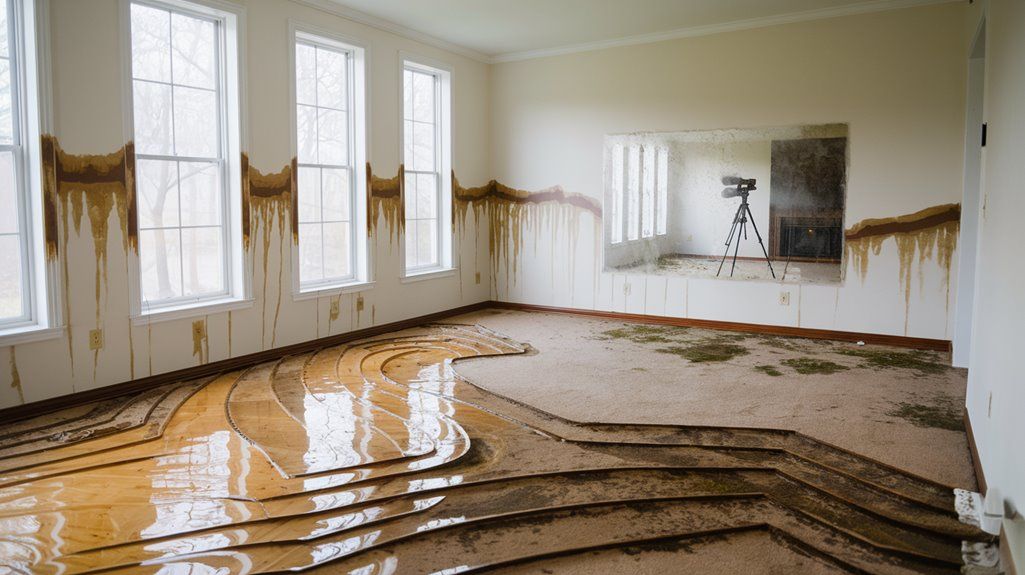
Selling a flooded house as-is means you transfer the property without making any repairs or improvements. You can save substantial money by avoiding costly repairs and renovation expenses. This option works well when you need to move quickly from a water-damaged home. If you lack proper insurance coverage, selling as-is becomes an even smarter choice.
Several benefits come with this selling approach:
- You will save time and skip the complex restoration process
- Your financial risks decrease since repairs often exceed initial estimates
- You can start fresh without managing a lengthy renovation project
Investors actively seek flooded properties to fix and resell them for profit. This fact makes your damaged house attractive to specific buyers. When you choose this path, the sale process becomes more straightforward and faster.
If you want to avoid renovation headaches, selling as-is provides immediate relief. So, you won’t need to worry about finding contractors or managing repairs. While the sale price might be lower, the quick transaction often balances this difference.
Why Sell to Cash Home Buyers?
Cash home buyers provide fast solutions for homeowners who need to sell damaged properties quickly. You can skip expensive repairs when working with these investors who buy flood-damaged homes.
They understand water damage issues and take properties in their current state. You will save money since they handle all restoration work after purchase.
This option offers quick closing times compared to traditional home sales. We can complete most transactions within a few days or weeks. If you choose cash buyers, you won’t deal with bank delays or lengthy paperwork.
So many expenses disappear when selling to cash buyers. You avoid realtor fees, repair costs, and other typical selling charges. It becomes easier to move forward without explaining flood damage to multiple buyers.
While traditional buyers might hesitate, cash investors welcome challenging properties. If your house has flood damage, these buyers will still make fair offers. This process eliminates the stress of marketing a damaged home to regular buyers.
Ready to Sell Your Flood Damaged House in Pennsylvania?
Pezon Properties buys flood-damaged houses across Pennsylvania for cash. We help homeowners who need to sell their water-damaged properties fast.
You can avoid the stress of repairing flood damage through our simple process. This solution works well for properties in Whitehall, Whitemarsh, Whitpain, Wilkes-Barre, and York Township.
We understand how challenging it is to sell a house after flood damage. If your home has suffered water damage, our team will assess its condition fairly.
Our services include:
- Fast closings without any hassles
- Fair cash offers based on current property condition
- Expert evaluation of flood damage
- Complete handling of repair assessments
You won’t need to spend money on expensive repairs before selling. So our team manages all aspects of the transaction efficiently.
If you choose us, we will take care of all disclosure requirements. Since we buy properties as-is, you can move forward quickly.
We offer a straightforward solution for Pennsylvania homeowners with flood-damaged properties. You can contact us today for a no-obligation cash offer.
Give us a call anytime at 484-484-0971 or fill out this quick form to get started today!
Get A Fair Cash Offer On Your House

About the author
Mathew Pezon
Mathew Pezon is the founder and CEO of Pezon Properties, a cash home buying company located in Lehigh Valley, Pennsylvania. With several years of experience in the real estate industry, Mathew has become a specialist in helping homeowners sell their properties quickly and efficiently. He takes pride in providing a hassle-free, transparent, and fair home buying experience to his clients. Mathew is also an active member of his local community and is passionate about giving back. Through his company, he has contributed to various charities and causes.




